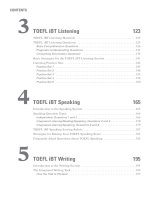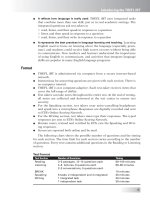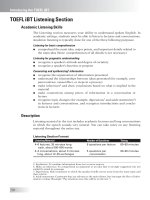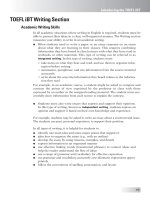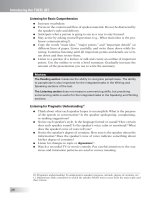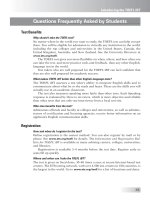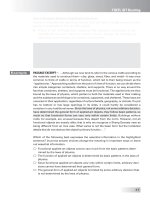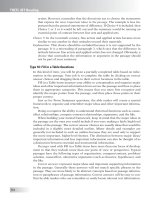The official guide to the toefl ibt third edition part 55 doc
Bạn đang xem bản rút gọn của tài liệu. Xem và tải ngay bản đầy đủ của tài liệu tại đây (129.57 KB, 7 trang )
369
Reading
14. Directions:
An introductory sentence for a brief summary of the passage is pro-
vided below. Complete the summary by selecting the THREE answer choices
that express the most important ideas in the passage. Some sentences do not
belong in the summary because they express ideas that are not presented in the
passage or are minor ideas in the passage.
This question is worth 2 points.
Several suggestions, ranging from light conditions to the presence of
metallic compounds, have been offered to explain why some icebergs
appear green.
b
b
b
Answer Choices
1. Ice cores were used to determine
that green icebergs were formed
from the compaction of metallic
compounds, including copper and
iron.
2. All ice shelves can produce green
icebergs, but the Amery Ice Shelf is
especially well suited to do so.
3. Green icebergs form when a two-
layer block of ice breaks away from a
glacier and capsizes, exposing the
bottom sea ice to view.
4. Ice cores and samples revealed that
both ice shelves and green icebergs
contain a layer of bubbly glacial ice
and a layer of bubble-free sea ice.
5. Green icebergs are white until they
come into contact with seawater
containing platelets and soluble or-
ganic green pigments.
6. In a green iceberg, the sea ice con-
tains large concentrations of organic
matter from the seawater.
STOP. This is the end of the Reading section of TOEFL iBT Practice Test 2
This page intentionally left blank
371
Directions: This section measures your ability to understand conversations and lec-
tures in English.
You should listen to each conversation and lecture only one time.
After each conversation or lecture, you will answer some questions about it. The ques-
tions typically ask about the main idea and supporting details. Some questions ask
about a speaker’s purpose or attitude. Answer the questions based on what is stated
or implied by the speakers.
You may take notes while you listen. You may use your notes to help you answer the
questions. Your notes will not be scored.
In some questions, you will see this icon: This means that you will hear, but not
see, part of the question.
Most questions are worth 1 point. If a question is worth more than 1 point, it will have
special directions that indicate how many points you can receive.
It will take about 60 minutes to listen to the Conversations and Lectures and to answer
the questions. You will have 35 minutes to respond to the questions. You should
answer each question, even if you must guess the answer.
At the end of this Practice Test you’ll find scripts for the audio tracks, an answer key,
and information to help you determine your score.
LISTENING
372
TOEFL iBT Practice Test 2
Listen to Audio Track 43.
Questions
Directions:
Mark your answer by filling in the oval or square next to your choice
.
1. Why does the student go to see the professor?
ɕ
For suggestions on how to write interview questions
ɕ
For assistance in finding a person to interview
ɕ
To ask for advice on starting a business
ɕ
To schedule an interview with him
2. Why does the student mention her high school newspaper?
ɕ
To inform the professor that she plans to print the interview there
ɕ
To explain why the assignment is difficult for her
ɕ
To show that she enjoys writing for school newspapers
ɕ
To indicate that she has experience with conducting interviews
3. How does the professor help the student?
ɕ
He gives her a list of local business owners.
ɕ
He allows her to interview business owners in her hometown.
ɕ
He suggests that she read the business section of the newspaper.
ɕ
He gives her more time to complete the assignment.
4. What does the professor want the students to learn from the assignment?
ɕ
That starting a business is risky
ɕ
Why writing articles on local businesses is important
ɕ
How to develop a detailed business plan
ɕ
What personality traits are typical of business owners
5.
Listen again to part of the conversation by playing Track 44.
Then answer the question.
What does the student imply?
ɕ
She is surprised by the professor’s reaction.
ɕ
The professor has not quite identified her concern.
ɕ
The professor has guessed correctly what her problem is.
ɕ
She does not want to finish the assignment.
373
Listening
GO ON TO THE NEXT PAGE g
Listen to Audio Track 45.
Questions
6. What does the professor mainly discuss?
ɕ
Various errors in early calendars
ɕ
Why people came to believe that Earth moves around the Sun
ɕ
Examples of various types of calendars used in different cultures
ɕ
The belief that the position of planets and stars can predict future events
7. The professor discusses various theories on how Stonehenge was used.
What can be inferred about the professor’s opinion?
ɕ
She is sure Stonehenge was used as a calendar.
ɕ
She believes the main use for Stonehenge was probably as a temple
or a tomb.
ɕ
She thinks that the stones were mainly used as a record of historical events.
ɕ
She admits that the purpose for which Stonehenge was constructed may never
be known.
8. According to the professor, how was the Mayan calendar mainly used?
ɕ
To keep track of long historical cycles
ɕ
To keep track of the lunar months
ɕ
To predict the outcome of royal decisions
ɕ
To allow priests to compare the orbits of Earth and Venus
374
TOEFL iBT Practice Test 2
9. According to the professor, what was the basis of the ancient Chinese
astrological cycle?
ɕ
The cycle of night and day
ɕ
The orbit of the Moon
ɕ
The cycle of the seasons
ɕ
The orbit of the planet Jupiter
10. How did the Romans succeed in making their calendar more precise?
ɕ
By changing the number of weeks in a year
ɕ
By adding an extra day every four years
ɕ
By carefully observing the motion of the planet Jupiter
ɕ
By adopting elements of the Chinese calendar
11. How does the professor organize the lecture?
ɕ
By mentioning the problem of creating a calendar, then describing various
attempts to deal with it
ɕ
By speaking of the modern calendar first, then comparing it with earlier ones
ɕ
By discussing how a prehistoric calendar was adapted by several different
cultures
ɕ
By emphasizing the advantages and disadvantages of using various time
cycles
375
Listening
GO ON TO THE NEXT PAGE g

